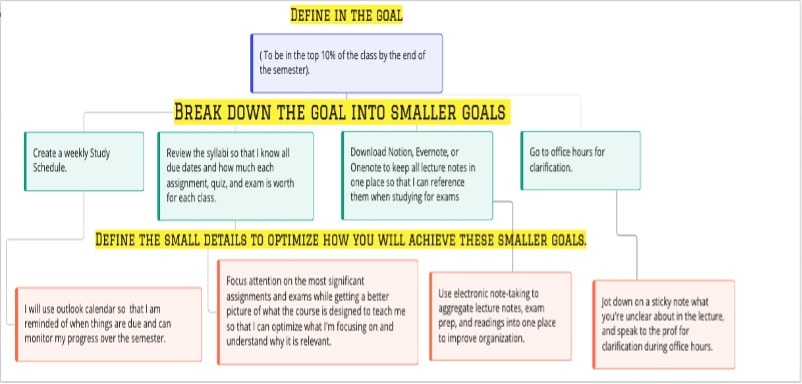Understanding Goals and Progress - What Is a Goal?
By Caleb Ripley
Congratulations! You’ve been admitted into the next chapter of your life and as the visions of future achievements start to flood your imagination, I wish you the very best! Higher education can be a rollercoaster at times, and I would like to offer a three-step approach so that you can achieve your maximum potential and sidestep some of the mistakes that others have made. First, is to define what a goal is, then we look at how to set yourself up to achieve the goals you set and finally we look at the importance of being consistent.
Understanding Goals and Progress - What Is a Goal?

Goals are important as a template for how you define the parameters of success. They help us envision the feeling of accomplishment as we get a certain grade or cross the finish line of a marathon. But what is a goal and how can we use goals to achieve success? A goal is a result you want to achieve, like getting a good grade on an exam, but getting the desired grade requires much more than just a desire for an outcome. In a lecture of 200 people, everyone wants to get an A, but very few people achieve this outcome. This tells us that people who succeed and those who fall short both have the same goals, so it cannot be the goal that differentiates successful people from unsuccessful people. To overcome this fact, we must transition from goal setting to developing the necessary habits which will allow us to improve the processes that lead to success. As a student, that means optimizing your study habits, focusing on your mental health, and making sure you’re aware of all the resources made available to you through your post-secondary institution. To create these optimal habits, and avoid the peaks and valleys of struggling through bad habits, I have three pieces of advice to help give you a kick start:
What is your goal? - A goal is the result you want; a system is a process that leads to those results. Focus on improving your habits that comprise the different areas of your life such as school, work, family and friends. Through improving on these areas, you will be able to refine the systems you engage with to achieve your goals. This is focusing on the process of setting and achieving goals and emphasizing how you will achieve a certain outcome. The following three questions are designed so that you can identify your goals.
- Why do I want this goal?
- What are the systems (Habits, routines, behaviors and mental processes) that are required of me to achieve this goal?
- When do I want to have this goal achieved by. It is important to give yourself a timeframe so that you can monitor your progress along the way to adjust.
* Now that we know what a goal is, we’ve gotten through the first step. Now, we can dive a bit deeper and look at how to set yourself up to achieve the goals you set
How Do I Create Systems That Make My Goals Possible?
Okay, now that we have set some parameters for what a goal isn’t, we can determine what a goal is, and which goals are worth striving for. To achieve these goals, we need to understand how to approach goals and we need to focus on the processes behind them rather than the outcomes. This means that to succeed in post-secondary education, being organized is the easiest way for you to succeed. To improve your processes, it is best to focus on a top-down approach. Let’s say our goal is to be in the top 10% of our class at the end of the fall semester.
EXAMPLE: Idea Tree

* When you improve your idea tree, you can make the smaller goals MECE (mutually exclusive-collectively exhaustive) meaning that they won’t overlap each other and will contribute to the larger goal.